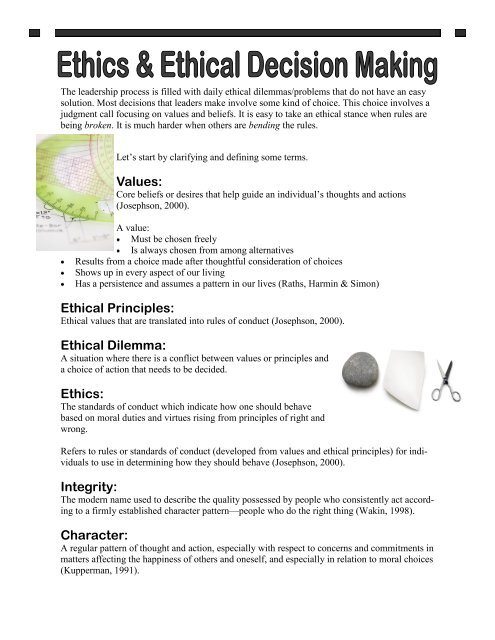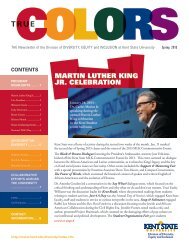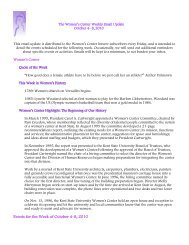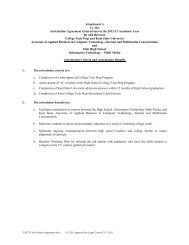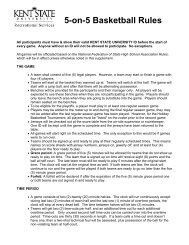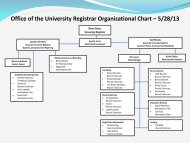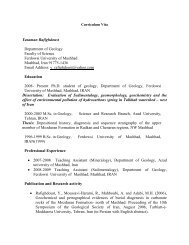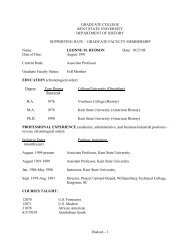Ethical Principles: Ethical Dilemma - Kent State University
Ethical Principles: Ethical Dilemma - Kent State University
Ethical Principles: Ethical Dilemma - Kent State University
Create successful ePaper yourself
Turn your PDF publications into a flip-book with our unique Google optimized e-Paper software.
The leadership process is filled with daily ethical dilemmas/problems that do not have an easy<br />
solution. Most decisions that leaders make involve some kind of choice. This choice involves a<br />
judgment call focusing on values and beliefs. It is easy to take an ethical stance when rules are<br />
being broken. It is much harder when others are bending the rules.<br />
Let’s start by clarifying and defining some terms.<br />
Values:<br />
Core beliefs or desires that help guide an individual’s thoughts and actions<br />
(Josephson, 2000).<br />
A value:<br />
Must be chosen freely<br />
Is always chosen from among alternatives<br />
Results from a choice made after thoughtful consideration of choices<br />
Shows up in every aspect of our living<br />
Has a persistence and assumes a pattern in our lives (Raths, Harmin & Simon)<br />
<strong>Ethical</strong> <strong>Principles</strong>:<br />
<strong>Ethical</strong> values that are translated into rules of conduct (Josephson, 2000).<br />
<strong>Ethical</strong> <strong>Dilemma</strong>:<br />
A situation where there is a conflict between values or principles and<br />
a choice of action that needs to be decided.<br />
Ethics:<br />
The standards of conduct which indicate how one should behave<br />
based on moral duties and virtues rising from principles of right and<br />
wrong.<br />
Refers to rules or standards of conduct (developed from values and ethical principles) for individuals<br />
to use in determining how they should behave (Josephson, 2000).<br />
Integrity:<br />
The modern name used to describe the quality possessed by people who consistently act according<br />
to a firmly established character pattern—people who do the right thing (Wakin, 1998).<br />
Character:<br />
A regular pattern of thought and action, especially with respect to concerns and commitments in<br />
matters affecting the happiness of others and oneself, and especially in relation to moral choices<br />
(Kupperman, 1991).
<strong>Ethical</strong> decisions require integrating multiple views and perspectives. You may find yourself in<br />
a decision-making situation that involves a conflict between two values you hold. Here is some<br />
information designed to assist you with your ethical decision making process.<br />
Five <strong>Ethical</strong> <strong>Principles</strong><br />
1. Respect Autonomy: Individuals have the right to decide how they live their lives, as long as<br />
their actions do not interfere with the welfare of others. One has the right to act as a free<br />
agent and has the freedom of choice and thought.<br />
2. Do No Harm: The obligation to avoid inflicting either physical or psychological harm on<br />
others may be a primary ethical principle.<br />
3. Benefit Others: There is an obligation to improve and enhance the welfare of others, even<br />
when such enhancements may be inconvenient or limit the freedom of the person offering<br />
the assistance.<br />
4. Be Just: To be just in dealing with others assumes equal treatment of all, to afford each individual<br />
their due portion.<br />
5. Be Faithful: One should keep promises, tell the truth, be loyal, and maintain respect and civility<br />
in human discourse. Only in so far as we sustain faithfulness can we expect to be seen<br />
as being trustworthy.<br />
Ethics Check:<br />
1. Is it legal? Is it safe? Will I be violating civil law or university policy?<br />
2. Is it balanced? Is it fair to all concerned? Does it promote win/win situations?<br />
3. Could the decision become habit forming?<br />
4. Does this choice lead to the greatest good for the greatest number?<br />
5. If something terrible were to happen, could I defend my actions?<br />
6. How will it make me feel about myself? Will it make me proud? Would I feel<br />
good if my hometown newspaper published my decision? Would I feel good if my<br />
family knew?<br />
Adapted from UW-Madison Orientation training materials<br />
Questions to Ask When Making an <strong>Ethical</strong> Decision<br />
What are the relevant facts?<br />
What is the ethical dilemma?<br />
Who are the key stakeholders? How might they be affected by your decision/<br />
options?<br />
What are your options?<br />
What are the potential risks/benefits of each option?<br />
What is your decision/best action?<br />
Can you, without hesitation, disclose your decision to your advisor/boss? Your<br />
family? The media?<br />
Resources<br />
Josephson Institute, http://josephsoninstitute.org<br />
Complete Guide to Ethics Management, http://www.mapnp.org/library/ethics/ethxgde.htm<br />
Exploring Leadership, 2nd edition. Komives, S.R., Lucas, N. & McMahon, T.R. (2007). San<br />
Francisco: Jossey-Bass Publishers, Inc.


